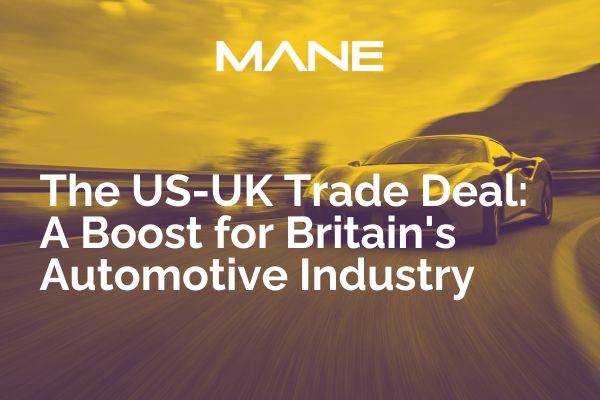The US-UK Trade Deal: A Boost for Britain's Automotive Industry
09 May, 20252 minsIn a significant development for international trade relations, Prime Minister Sir Keir Star...

In a significant development for international trade relations, Prime Minister Sir Keir Starmer and US President Donald Trump have announced a new trade agreement between the United Kingdom and the United States. This deal, described by both leaders as "historic," offers particular relief to the UK automotive sector, which had been facing prohibitive tariffs that threatened exports and jobs.
What's in the Deal?
The agreement marks a notable shift in trading conditions, particularly for Britain's car manufacturers. Under the new terms, US tariffs on UK car exports will be reduced from 27.5% to 10% for the first 100,000 vehicles each year. This quota essentially covers the current export volume, as approximately 101,000 vehicles were exported to the US last year.
Additionally, the 25% tariff previously imposed on UK steel and aluminium has been completely removed, offering significant relief to British metal exporters. The deal also includes provisions for agricultural products, with both countries granted a quota for 13,000 metric tonnes of beef to be exported tariff-free.
It's worth noting that this agreement represents the first such deal since President Trump initiated a global tariff war by imposing new levies on imports from most countries around the world. While the baseline 10% tariff on most UK goods will remain in place, the specific reductions for automotive and metal exports are substantial wins for those industries.
Impact on the Automotive Sector
The automotive sector stands to gain significantly from this agreement. Jaguar Land Rover (JLR), one of Britain's premier car manufacturers with facilities in Coventry, Solihull, and Wolverhampton, had temporarily paused exports to the US in response to the previous high tariffs but has since resumed shipments.
JLR's chief executive, Adrian Mardell, welcomed the deal, stating that it "secures greater certainty for our sector and the communities it supports." This sentiment reflects the importance of the US market to British luxury car brands. For companies like JLR, Rolls-Royce, Bentley, and Aston Martin, the American market represents a crucial export destination.
The reduction in tariffs will help maintain competitiveness of British vehicles in the American market, potentially preserving market share that might otherwise have been lost due to price increases. However, the 100,000-vehicle cap could potentially limit growth if export volumes increase substantially in the future.
Professor David Bailey from Birmingham Business School, an expert on the automotive industry, called the deal "potentially huge for JLR, UK auto and the West Midlands," highlighting that cars are the UK's number one export to the US.
Safeguarding UK Jobs
The employment implications of this deal cannot be overstated. The British automotive industry directly sustains approximately 250,000 jobs across the country, with many more in the supply chain. These positions had been at risk due to the trade tensions.
Business Secretary Jonathan Reynolds highlighted the urgency of the deal, telling the BBC that the UK was "days away from losing thousands of jobs at carmakers facing US tariffs" before the agreement was reached. "This was very serious," he added. "It would have meant people would have lost their jobs without this breakthrough."
For regions like the West Midlands, where car manufacturing forms a backbone of the local economy, the deal provides crucial breathing space. With major manufacturers like JLR, Morgan in Malvern, Bentley in Crewe, and Aston Martin in Gaydon, the area is particularly dependent on the health of the automotive export market
Steve Rigby, chief executive of the Rigby Group, a technology investment company based in the West Midlands, had previously prepared a report on the potential impact of higher tariffs, which revealed they would pose a "structural risk to the regional and national economy." Following the announcement, he stated, "This deal moves us out of the red zone... It comes just in time for the West Midlands economy and the UK's car industry."
Looking Forward
While the agreement has been welcomed by industry leaders, some experts caution that it falls short of a comprehensive free trade deal. The retention of the baseline 10% tariff on most goods means that British exporters will still face challenges in the American market.
Additionally, some details remain to be ironed out, with both governments indicating that further discussions will take place to finalise all aspects of the trade relationship. Labour MPs have praised the deal, while opposition parties have called for more detail and parliamentary scrutiny.
For the automotive sector, however, the immediate threat has been mitigated. The agreement provides stability and predictability, allowing manufacturers to plan their American export strategy with greater confidence. It also buys time for the industry to continue its transition to electric vehicles without the added pressure of prohibitive tariffs.
As Sir Keir Starmer noted during his visit to JLR's Solihull site, "We are the first country to secure such a deal with the United States. In an era of global insecurity and instability, that is so important."
The coming months will reveal the full impact of this agreement on Britain's automotive sector, but for now, it appears to have provided a much-needed lifeline for one of the UK's most important industries and the communities that depend on it.


